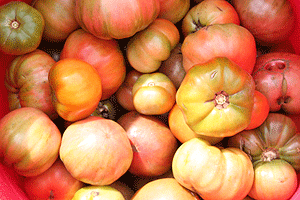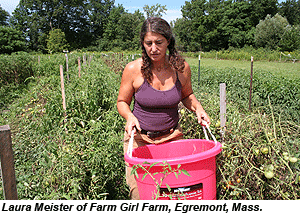Why
should I care?
Harvest
without getting your hands dirty
Jonathan
Schwab and Jim Furbush
 The
summer tomato is an earthly delight. It leaks on the plate, it tastes
sweet, it demands to be eaten. The anticipation of a ripening tomato,
as it turns from pale green to fire red, can drive a connoisseur
mad. Throw a slice or two into a BLT and you won't find a more decadent
sandwich. Heck, even with just a pinch of salt, your taste buds
will flutter in ecstasy. The
summer tomato is an earthly delight. It leaks on the plate, it tastes
sweet, it demands to be eaten. The anticipation of a ripening tomato,
as it turns from pale green to fire red, can drive a connoisseur
mad. Throw a slice or two into a BLT and you won't find a more decadent
sandwich. Heck, even with just a pinch of salt, your taste buds
will flutter in ecstasy.
Now you can
eat that tomato and dozens just like it, along with cucumbers, corn,
and eclectic vegetables you never imagined, like kohlrabi, all summer
long without ever starting a garden. The secret is found in a growing
movement: community supported agriculture.
The concept
behind Community Supported Agriculture is that consumers invest
in local farmers. For a predetermined up front payment, say $425
a season, consumers receive a “share” of the farmer's
harvest from May to October. The cash-strapped farmer gets an infusion
of money to keep the crops going; in essence the consumers are a
bunch of business partners. For their part, consumers receive a
weekly box of locally grown organic veggies during harvest.
Barbara Purby,
of Forbidden Fruit
Farm in South Dartmouth has been in the farming business for
years, but it wasn’t until last year she decided to run her
farm as a CSA. The 53-year old farmer said she has swelled her membership
to 75 shares this year. People in her community are eager to taste
her gooseberries and green beans in April and May, to munch on basil
and lemon cucumbers in June, and to take delight in grapes and heirloom
tomatoes during the peak season in August.
As the local farmer goes the way of the Edsel,
Purby insisted becoming a CSA farm is one of the only ways a small
grower can make a living farming. It allows “small, diversified
farms to stay viable.” Diversified, she explained, means growing
a wide variety of crops, each type taking up one small area, rather
than having hundreds of acres of corn, as one would see on a drive
through Nebraska.
 The
movement began in 1986 on a farm in western Massachusetts. The ideas
were based upon European biodynamic agriculture. The history of
the CSA movement is relatively boring. What's important is this:
it's a relatively new economic model for local farms based upon
the convergence of the stock exchange and sustainable, micro-organic
agriculture. The
movement began in 1986 on a farm in western Massachusetts. The ideas
were based upon European biodynamic agriculture. The history of
the CSA movement is relatively boring. What's important is this:
it's a relatively new economic model for local farms based upon
the convergence of the stock exchange and sustainable, micro-organic
agriculture.
“If it’s
a horrible tomato season, you’re not screwed,” said
Laura Meister, of Farm Girl
Farm in Egremont, Mass. The deal is great for farmers, but a
horrible tomato season means the consumer gets pinched. In CSA,
there are no refunds for a light week or even for a missed week,
assuming the crops went bad.
For some CSA
members going to the farm to pick up their share and harvest a few
tomatoes, it's the closest they’ve ever been to farm living.
Scott Kathan, 37, a Somerville-based magazine editor, is starting
his fourth straight season as member of the Parker Farms in Waltham,
owned by Stephen Parker.
“Our
original motivations were to support the healthy eating lifestyle,”
said Kathan, “and also to support local farmers. Farming’s
a tough way to make a living in this day and age in this country.”
Kathan doesn’t
have the time to tend to a garden of his own, but the produce from
Parker Farms reminds him of the large garden, with it’s abundance
of produce, his parents tended during his childhood.
“I think
the demand for high quality produce is certainly better than it
was five years ago,” he said.
Advocates of organic food say that it is healthier and it tastes
better than vegetables grown conventionally. The Northeast
Organic Farming Association gives about a thousand reasons on
their website, but the gist is that organic food is grown by farmers
who are committed to crops and livestock that are free from chemical
fertilizers and pesticides. Organic farms don’t pollute the
water we drink or send pesticides into our kitchens.
Some restaurants
buy straight from CSAs to get the freshest produce available. A
restaurant in Cambridge has taken that relationship to another level.
 Chef
Ana Sortun, the owner of Oleana,
is married to the farmer that supplies her produce. The Cambridge
health spot serves food grown at Siena Farms in Sudbury. The 12
acres of farms belong to husband Chris Kurth. The relationship seems
to work, as Oleana was named one of the “Best New Restaurants
in America” by Esquire Magazine
in 2001. Chef
Ana Sortun, the owner of Oleana,
is married to the farmer that supplies her produce. The Cambridge
health spot serves food grown at Siena Farms in Sudbury. The 12
acres of farms belong to husband Chris Kurth. The relationship seems
to work, as Oleana was named one of the “Best New Restaurants
in America” by Esquire Magazine
in 2001.
“In a perfect world, I would have everything organic all the
time, but considering the fact that we’re in New England,
it’s hard to do that,” Sortun said.
“What’s
different about us [from most CSAs] is, as a restaurant we're capable
of buying and using so many vegetables, it would give him a big
chunk of money,” she added.
.
Waltham Fields Community
Farm is in its 11th year. Amanda Cather, who co-owns the farm
with her husband, said the farm is not certified organic, but that
it uses all organic materials in crop growing. Cather explained
that becoming certified requires a complex, expensive and time-consuming
process of getting a certifier and having him or her come out and
inspect a farmer’s records to make sure the farmer is following
all U.S. Department of Agriculture’s regulations.
Cather said
this spring is the third season they will be selling directly to
customers because, “usually if you have the privilege of doing
direct marketing, you have a relationship" with the investors.
Cather added
that she sees a change in the CSA market -- for the better. She
said the CSA market is growing, most likely because when people
"join they connect with one another. It’s about eating,
making connections with food and land and people.”
To find a Mass
CSA farm near you, see:
http://www.csacenter.org/
For the ins
and outs of the history of the movement, see:
http://www.newfarm.org/features/0104/csa-history/part1.shtml
Jonathan
Schwab can be reached at jschwab@theoysteronline.com
Jim Furbush
can be reached at jfurbush@theoysteronline.com
Photos courtesy of Vali Valente.
04/05/2006
| Permalink
|

